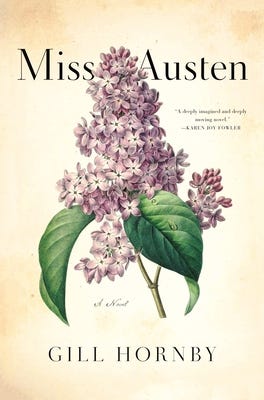Book Recommendation: Miss Austen
Gail Hornby's novel about Jane Austen's sister Cassandra is convincing and poignant.
Friends, there’s a reason that twice a month I offer “book recommendations” and not “book reviews.” I do not want to give a fair, honest opinion about a book, only to tell you, “but don’t bother reading it, it was a waste of my time and would be a waste of yours.” If I hate a book, you won’t hear about it here. I want this to be a resource. It’s a way to pay forward the great recommendations I get from other people.
One such great recommendation was Gail Hornby’s Miss Austen, which features Jane Austen’s older sister Cassandra as an old woman. Jane Austen died at forty-one and asked her sister to burn her old letters, journals, and unfinished writing. The novel imagines how this would look, years later, as Cassandra tries to steal back and destroy the letters that had been sent to old friends. These letters, which she reads before destroying, offer flashbacks to their life many decades before.
Naturally, this is an imaginative work of fiction. Hornby has both the advantage and the difficulty that all of those letters were really destroyed. In such cases, the author can imagine anything she likes, as long as it doesn’t firmly contradict what we know about the author and her family. Hornby, who despite not being an Austen historian consulted several historians while writing her manuscript, tells a convincing story about a bright, talented family.
No known scandals survived all of those burnt letters, and Hornby does not invent anything very shocking. Instead, she shows how a group of naturally private people would want to hide some intimate details about their lives, even if those details are perfectly ordinary family “secrets”: complaints about relatives, allusions to grief, reminiscences about a brief courtship.
The relationship between the two sisters is touching and believable. We can see how Jane, who was perhaps more temperamental and averse to change than Cassandra, loved to write steady, dutiful heroines like her sister, as well as the more playful ones who resembled herself. Cassandra herself, especially the 1840 spinster, has some delightfully acerbic thoughts veiled behind her polite, kindly exterior. Nice people can think of mean things to say; they just keep them to themselves.
“Why travel was said to broaden the mind she could never quite fathom. The company of those whom travel had blessed was often so splendidly dull.”
“She studied the samplers on the walls that Eliza had chosen to wake up to each morning: simple prayers and mottoes stitched by childish hands. ‘There is no place like home,’ she read, and shook her head: so trite, and really, very poorly sewn. How very odd of Eliza to first mount and then live with them. But then these were the indignities that motherhood entailed: women of taste forced to cherish that which did not deserve to be tolerated. One of the many blessings of the spinster state was that at least one’s walls were one’s own.”
The novel also has many emotional highs and lows, especially since the flashbacks follow the Austen sisters into poverty and Jane’s death after a long illness.
But I think my favorite part is the way it invites us to see the seemingly ordinary and unpoetic people in our lives. From the outside, Cassandra Austen is the maiden aunt most people merely tolerate. After being useful all her life, she now tires easily, and her small income forces her to require other’s hospitality. She does not cut a romantic figure, but she retains all the qualities that would have made her an excellent young heroine.
As Hornby reflects,
“Whoever looked at an elderly lady and saw the young heroine she once was?”





